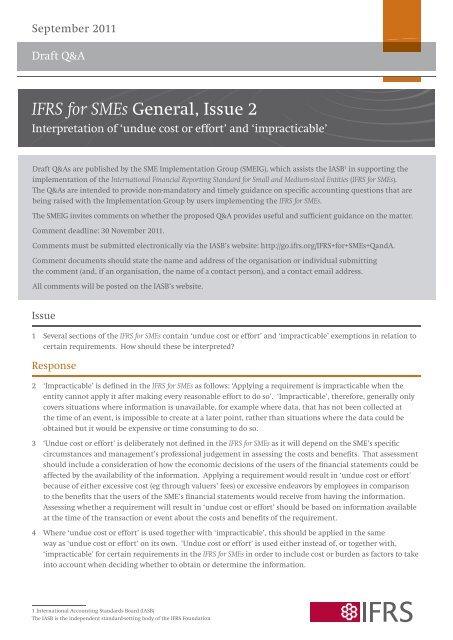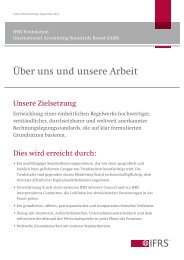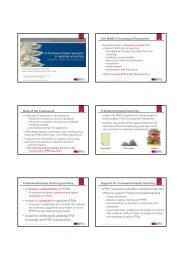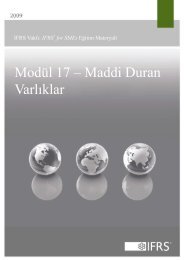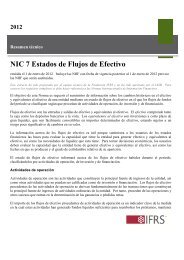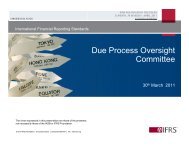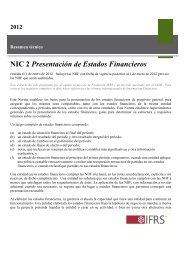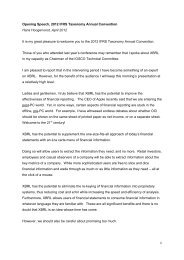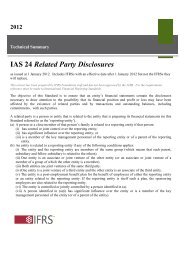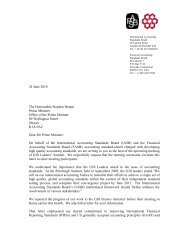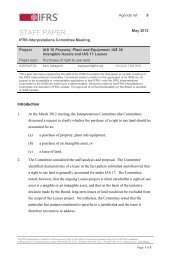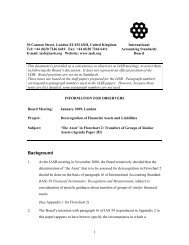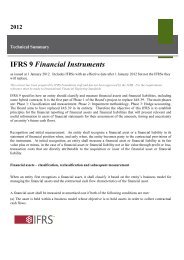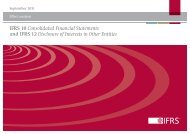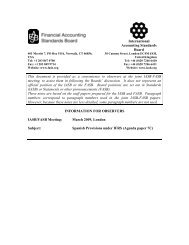'undue cost or effort' and - EFRAG
'undue cost or effort' and - EFRAG
'undue cost or effort' and - EFRAG
Create successful ePaper yourself
Turn your PDF publications into a flip-book with our unique Google optimized e-Paper software.
September 2011<br />
Draft Q&A<br />
IFRS f<strong>or</strong> SMEs General, era<br />
Issue 2<br />
Interpretation of ‘undue <strong>cost</strong> <strong>or</strong> eff<strong>or</strong>t’ <strong>and</strong> ‘impracticable’ icable’<br />
Draft Q&As are published by the SME Implementation Group (SMEIG), which assists the IASB 1 in supp<strong>or</strong>ting the<br />
implementation of the International Financial Rep<strong>or</strong>ting St<strong>and</strong>ard f<strong>or</strong> Small <strong>and</strong> Medium-sized Entities (IFRS f<strong>or</strong> SMEs).<br />
The Q&As are intended to provide non-m<strong>and</strong>at<strong>or</strong>y <strong>and</strong> timely guidance on specific accounting questions that are<br />
being raised with the Implementation Group by users implementing the IFRS f<strong>or</strong> SMEs.<br />
The SMEIG invites comments on whether the proposed Q&A provides useful <strong>and</strong> sufficient guidance on the matter.<br />
Comment deadline: 30 November 2011.<br />
Comments must be submitted electronically via the IASB’s website: http://go.ifrs.<strong>or</strong>g/IFRS+f<strong>or</strong>+SMEs+Q<strong>and</strong>A.<br />
Comment documents should state the name <strong>and</strong> address of the <strong>or</strong>ganisation <strong>or</strong> individual submitting<br />
the comment (<strong>and</strong>, if an <strong>or</strong>ganisation, the name of a contact person), <strong>and</strong> a contact email address.<br />
All comments will be posted on the IASB’s website.<br />
Issue<br />
1 Several sections of the IFRS f<strong>or</strong> SMEs contain ‘undue <strong>cost</strong> <strong>or</strong> eff<strong>or</strong>t’ <strong>and</strong> ‘impracticable’ exemptions in relation to<br />
certain requirements. How should these be interpreted?<br />
Response<br />
2 ‘Impracticable’ is defined in the IFRS f<strong>or</strong> SMEs as follows: ‘Applying a requirement is impracticable when the<br />
entity cannot apply it after making every reasonable eff<strong>or</strong>t to do so’. ‘Impracticable’, theref<strong>or</strong>e, generally only<br />
covers situations where inf<strong>or</strong>mation is unavailable, f<strong>or</strong> example where data, that has not been collected at<br />
the time of an event, is impossible to create at a later point, rather than situations where the data could be<br />
obtained but it would be expensive <strong>or</strong> time consuming to do so.<br />
3 ‘Undue <strong>cost</strong> <strong>or</strong> eff<strong>or</strong>t’ is deliberately not defined in the IFRS f<strong>or</strong> SMEs as it will depend on the SME’s specific<br />
circumstances <strong>and</strong> management’s professional judgement in assessing the <strong>cost</strong>s <strong>and</strong> benefits. That assessment<br />
should include a consideration of how the economic decisions of the users of the financial statements could be<br />
affected by the availability of the inf<strong>or</strong>mation. Applying a requirement would result in ‘undue <strong>cost</strong> <strong>or</strong> eff<strong>or</strong>t’<br />
because of either excessive <strong>cost</strong> (eg through valuers’ fees) <strong>or</strong> excessive endeav<strong>or</strong>s by employees in comparison<br />
to the benefits that the users of the SME’s financial statements would receive from having the inf<strong>or</strong>mation.<br />
Assessing whether a requirement will result in ‘undue <strong>cost</strong> <strong>or</strong> eff<strong>or</strong>t’ should be based on inf<strong>or</strong>mation available<br />
at the time of the transaction <strong>or</strong> event about the <strong>cost</strong>s <strong>and</strong> benefits of the requirement.<br />
4 Where ‘undue <strong>cost</strong> <strong>or</strong> eff<strong>or</strong>t’ is used together with ‘impracticable’, this should be applied in the same<br />
way as ‘undue <strong>cost</strong> <strong>or</strong> eff<strong>or</strong>t’ on its own. ‘Undue <strong>cost</strong> <strong>or</strong> eff<strong>or</strong>t’ is used either instead of, <strong>or</strong> together with,<br />
‘impracticable’ f<strong>or</strong> certain requirements in the IFRS f<strong>or</strong> SMEs in <strong>or</strong>der to include <strong>cost</strong> <strong>or</strong> burden as fact<strong>or</strong>s to take<br />
into account when deciding whether to obtain <strong>or</strong> determine the inf<strong>or</strong>mation.<br />
1 International Accounting St<strong>and</strong>ards Board (IASB)<br />
The IASB is the independent st<strong>and</strong>ard-setting body of the IFRS Foundation
September 2011<br />
Draft Q&A<br />
5 To include an exemption f<strong>or</strong> impracticability alone would mean that an SME would be required to follow the<br />
requirements if it is possible to obtain <strong>or</strong> determine the inf<strong>or</strong>mation, regardless of the <strong>cost</strong> <strong>or</strong> eff<strong>or</strong>t required.<br />
F<strong>or</strong> example, an SME would be expected to engage a valuer, actuary <strong>or</strong> other professional to make a particular<br />
measurement, regardless of the <strong>cost</strong>, provided the valuer expects to be able to develop a reliable valuation<br />
of the asset.<br />
Basis f<strong>or</strong> Conclusions<br />
BC1 Impracticable is defined in the IFRS f<strong>or</strong> SMEs in the same way as under full IFRSs. The definition refers to eff<strong>or</strong>t,<br />
but not to <strong>cost</strong>. Theref<strong>or</strong>e, some people have concluded that if the data required in <strong>or</strong>der to apply a principle<br />
in an IFRS can be obtained, an entity must do so regardless of <strong>cost</strong>.<br />
BC2 It could be argued that ‘every reasonable eff<strong>or</strong>t to do so’ would not include spending excessive resources<br />
in <strong>or</strong>der to comply with a requirement. However, enquiries to the IASB concerning the difference between<br />
‘impracticable’ <strong>and</strong> ‘undue <strong>cost</strong> <strong>or</strong> eff<strong>or</strong>t’ suggest that the IFRS f<strong>or</strong> SMEs is not clear as to whether <strong>cost</strong> alone<br />
would render a requirement impracticable.<br />
BC3 The inclusion of ‘undue <strong>cost</strong> <strong>or</strong> eff<strong>or</strong>t’ f<strong>or</strong> certain requirements in the IFRS f<strong>or</strong> SMEs is intended to clarify that<br />
<strong>cost</strong> is a consideration when applying that requirement. Although there is no direct reference to benefits in<br />
the term, in <strong>or</strong>der to assess whether <strong>cost</strong> <strong>and</strong> eff<strong>or</strong>t is ‘undue’ SMEs would have to make an assessment of how<br />
imp<strong>or</strong>tant the inf<strong>or</strong>mation is to users.<br />
The IASB, the IFRS Foundation, the auth<strong>or</strong>s <strong>and</strong> the publishers do not accept responsibility f<strong>or</strong> loss caused to any person who acts <strong>or</strong> refrains from acting in reliance on the material<br />
in this publication, whether such loss is caused by negligence <strong>or</strong> otherwise. The following materials are drafts <strong>and</strong> may be subject to revision <strong>or</strong> change bef<strong>or</strong>e f<strong>or</strong>mal issue.<br />
Copyright © 2011 IFRS Foundation®<br />
The IFRS f<strong>or</strong> SMEs <strong>and</strong> IFRSs (which include International Accounting St<strong>and</strong>ards <strong>and</strong> Interpretations) are copyright of the IFRS Foundation. The auth<strong>or</strong>itative text of the IFRS f<strong>or</strong><br />
SMEs <strong>and</strong> IFRSs is that issued by the IASB in the English language. Copies may be obtained from the IFRS Foundation Publications Department. Please address publication <strong>and</strong><br />
copyright matters to:<br />
IFRS Foundation Publications Department<br />
30 Cannon Street | London EC4M 6XH | United Kingdom | Telephone: +44 (0)20 7332 2730 |Fax: +44 (0)20 7332 7249 | Email: publications@ifrs.<strong>or</strong>g | Web: www.ifrs.<strong>or</strong>g<br />
All rights reserved. No part of this publication may be translated, reprinted <strong>or</strong> reproduced <strong>or</strong> utilised in any f<strong>or</strong>m either in whole <strong>or</strong> in part <strong>or</strong> by any electronic, mechanical <strong>or</strong> other<br />
means, now known <strong>or</strong> hereafter invented, including photocopying <strong>and</strong> rec<strong>or</strong>ding, <strong>or</strong> in any inf<strong>or</strong>mation st<strong>or</strong>age <strong>and</strong> retrieval system, without pri<strong>or</strong> permission in writing from the<br />
IFRS Foundation.<br />
The IFRS f<strong>or</strong> SMEs logo, the IFRS Foundation logo, the IASB logo, the “Hexagon Device”, “IFRS Foundation”, “eIFRS”, “IAS”, “IASB”, “IASC Foundation”, “IASCF”, “IFRS f<strong>or</strong> SMEs”, “IASs”,<br />
“IFRIC”, “IFRS”, “IFRSs”, “International Accounting St<strong>and</strong>ards”, “International Financial Rep<strong>or</strong>ting St<strong>and</strong>ards” <strong>and</strong> “SIC” are Trade Marks of the IFRS Foundation.


